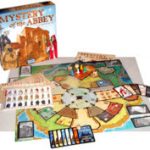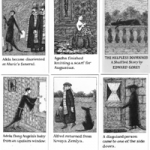first person
On Mystery of the Abbey

Bruno Faidutti begins with the controversial premise that "[e]very game tells a story," in his description of how he uses literary techniques to enhance gameplay - even in non-RPG systems such as board games, which don't traditionally include a story.
Creating a Meaning-Machine: The Deck of Stories Called Life in the Garden

Eric Zimmerman describes his interactive paper book as "an inverted exquisite corpse," and although a digital version of the book would be easy to produce, he argues that an electronic edition would not produce as meaningful an experience as the printed volume.
On Life’s Lottery
Kim Newman describes various methods of approaching his choose-your-own-adventure-style novel, which can be read or played because, like a role-playing game, "you are at once a reader and the main character."
Structure and Meaning in Role-Playing Game Design

Using Exalted as her text, Rebecca Borgstrom begins with the premises that every role-playing game requires a setting, and that to establish a fictional world players work within a mutually agreed upon structure to construct meaning.
Making Games That Make Stories

James Wallis uses genre as the fulcrum for balancing game rules and narrative structure in story-telling games, which he differentiates from RPGs through their emphasis on the creation of narrative over character development.